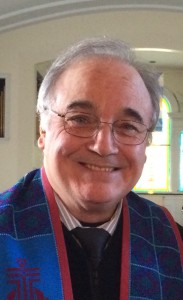Reflections in light of the renewal of relations between the United States and Cuba – Rev. Dr. Antonio (Tony) Aja
 Yesterday, I shared perspectives of Cuban Christian leaders on the renewal of relations between the US and Cuba, and the role of the churches in this rapprochement. Today, we turn to insights from Cuban exiled colleagues.
Yesterday, I shared perspectives of Cuban Christian leaders on the renewal of relations between the US and Cuba, and the role of the churches in this rapprochement. Today, we turn to insights from Cuban exiled colleagues.
The Rev. Magdalena I. Garcia, a PCUSA minister who also migrated to the U.S. at a young age, writes the following:
When I heard about President Obama’s initiative to restore relations with Cuba, I was overjoyed. I immediately uploaded an NPR story to my Facebook wall with the following introduction, ‘It was about time. Thank you, Mr. President.’ That was the beginning of many days of reading and posting reactions to the announcement from various voices and media around the world, both in favor and against Obama’s initiative, and the end of my Facebook friendship with some of my own cousins in the US! The historic revolution of 1959 and its ensuing chapters—many of which have glorious social accomplishments along with nefarious footnotes on human rights violations—are an open, bleeding wound for all Cuban families on both sides of the Florida Straits, but one that clamors for healing.[1]
Those wounds to which Rev. Garcia refers are still deeply embedded in the minds of some Cubans in the U.S. Prominent anti-Castro leader the Rev. Martin Añorga, a Presbyterian pastor who has lived in Miami, Florida, since the early 1960s, expressed to me his point of view on the situation in Cuba:
Inside the Island the future of the church depends entirely on the government. The Revolution took away from the churches the right to have private schools and to maintain ministries related to healthcare. The Cuban government also prevents the church access to the public media. As long as these norms continue, there will not be a substantial beneficial change for the proclamation of the Gospel in Cuba.
Another yet different opinion by another Cuban exile warns of the danger of seeing the current normalization of relations between the two countries from only a religious point of view. The Rev. Jose Luis Casal, General Missioner of the Presbytery of Tres Rios in Texas, writes the following:
To limit the discussion to a religious context is just to generalize and spiritualize the dialogue leaving out of consideration the complexity of the social fabric of the Cuban society. If the Church in Cuba and in the United States wants to be a factor of influence, it has to accept the challenge and risk to address the problems of the Cuban society with the language of the society and abandon the religious jargon. The religious language many times is used to preserve the status and privileges of the church, but the spirit of the Gospel goes beyond a particular language and transcends particular structures to incarnate in the society. To preach at the society is to incarnate in the society.
In summary, the relationship between the U.S. and the Cuban Presbyterian church has remained strong through the years of the Revolution. Some even believe this relationship may have helped to bridge the abysm between the two peoples to a certain extent. The question yet remains if the two churches will still be able to influence the process.
Personally, I would like to see the church on both countries continue to live up to their commitment to justice and peace. Most agree that, in spite of both the Embargo and the policies of the Cuban government, many of the social gains of the Revolution deserve to continue in full force. Universal health care and education for all the Cuban people, for example, should be lauded and supported by the U.S. church.
Moreover, if any political changes take place, it should be up to the Cuban people and on their own terms. There I would like to see the U.S. church opposing any type of overt intrusion from the part of the U.S. At the same time, efforts to “invade” Cuba with the ills of unchecked capitalism and economic globalization should also be opposed by the church in North America.
Regardless, the Gospel principles of reconciliation and forgiveness should guide the process. May the God of love and justice, whose reach transcends even the church, reign once again in this effort to bring about peace between the two countries.
Tony Aja is a Teaching Elder member of the Presbytery of Santa Fe, Presbyterian Church (USA), and currently serves as pastor of Westminster Presbyterian Church in Santa Fe, New Mexico. He earned a Doctor of Ministry degree at McCormick Theological Seminary. A former refugee from Cuba, Tony has developed new ministries with refugees and immigrants in Florida and Kentucky. He has been a missionary, pastor, executive director of an ecumenical community ministry and staff at PC(USA) headquarters and Mid-Kentucky Presbytery. Tony has served in local and national boards and committees dealing with social justice and immigrant and refugee issues. He has helped develop grass-roots organizations with both local and national scope.
Tony is happily married to Elder Loyda P. Aja and they have three grown children: Alan (married to Wendy Trull); Vanessa (married to the Rev. David Aja-Sigmon); and Bryan (married to Misty Schmidt). Loyda and Tony are the proud grandparents of Lucas Joaquin, Liam Elian Antonio, and Jesse Miguel.
[1] Rev. Garcia currently works as Hospice Chaplain for Vitas Healthcare in the Chicago area. In her blog, http://justleros.blogspot.com/2014/12/me-duele-cuba-cuba-pains-me.html, she elaborates further on her feelings about the issue.
